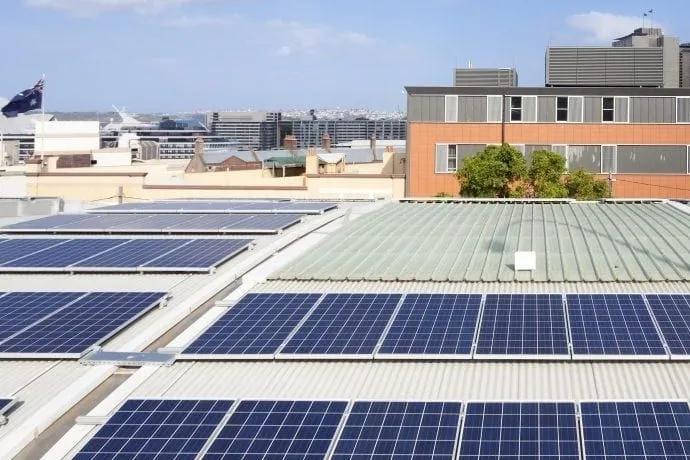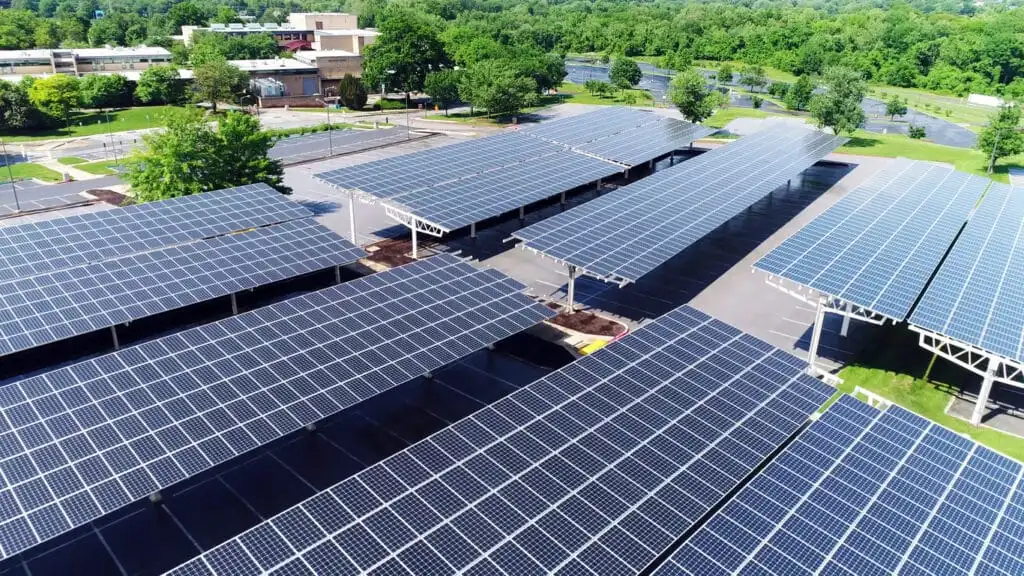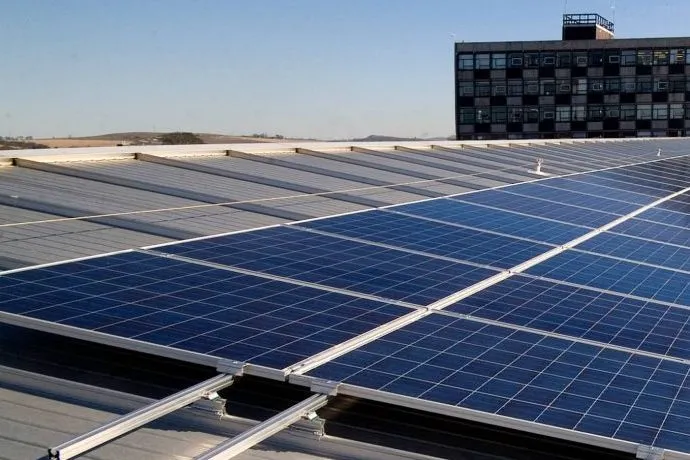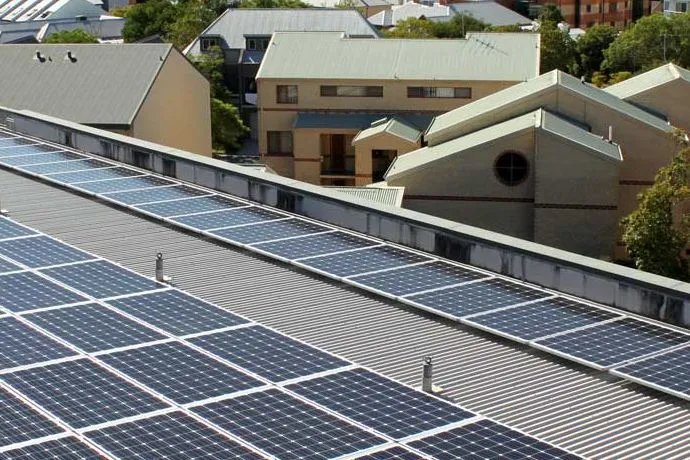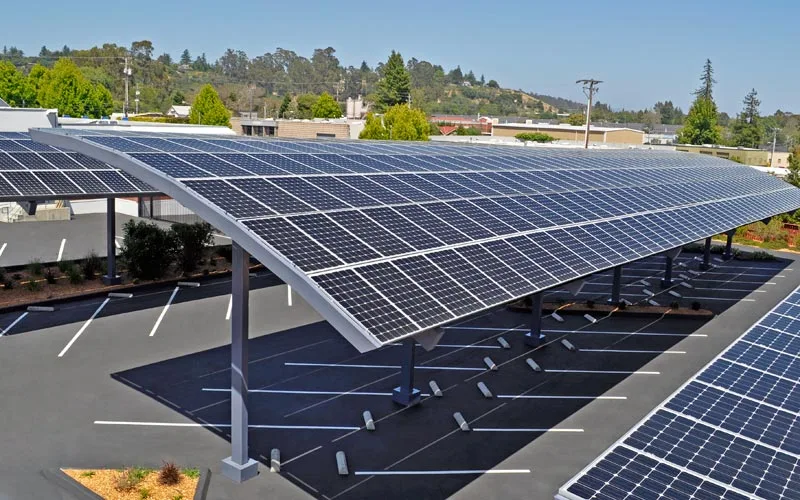Harnessing the power of the sun for commercial purposes has become an increasingly popular and sustainable choice for businesses worldwide.
Whether you’re a business owner eyeing sustainability or an individual exploring the commercial solar landscape, join us on this journey to discover the ins and outs of commercial solar to sell in this comprehensive guide. From understanding the technology and installation process to navigating costs, incentives, and the best companies in the market, we’ve got you covered.
What are commercial solar panels?
Commercial solar is a solar system used for commercial, industrial, or public purposes. Solar panels for commercial buildings are usually larger and more powerful than residential ones and can produce more electricity. Commercial solar systems are often grid-connected or hybrid, where excess electricity is sold to the grid or stored for use in times of low sunlight or peak demand.
Where can commercial solar panels be installed?
Commercial solar panels can be installed in various locations, such as rooftops, parking lots, ground mounts, water bodies, and more.
Commercial building rooftops and awnings
This is a common option for office buildings, factories, warehouses, and other similar spaces that have large, flat roofs that can accommodate solar panels. Roof-mounted solar panels can reduce cooling costs and provide shade for the building.
Ground level
The ground level is another common location for commercial solar panel installations and is suitable for businesses or organizations that have a large amount of available land. Ground-mounted solar systems can be selected with fixed or tracking mounts depending on the terrain and sunlight conditions to improve power generation efficiency.
Car parks
Car parks are a combination of practical and aesthetically pleasing locations for commercial solar panel installations. They provide shade and protection from the rain, while also generating clean electricity. Car park solar systems are often mounted in steel or aluminum structures to harmonize with the design style of the car park.
Agriculture
Agriculture is a location full of ideas and potential for commercial solar panel installations. They can be combined with crops, livestock, or aquaculture to create a win-win model. Agricultural solar systems can be selected with the right height, spacing, and angle for light and ventilation, depending on the type of agriculture.
Carports and parking shades
This is a creative way to use the space above parking lots and garages to generate solar power. Solar carports can also protect vehicles from weather and heat, and create a more comfortable environment for drivers and passengers.
Water bodies such as ponds and artificial lakes
This is an innovative solution for installing solar panels on water surfaces, such as reservoirs, irrigation ponds, and wastewater treatment plants. Floating solar panels can reduce water evaporation, algae growth, and land use while increasing the efficiency of the panels due to the cooling effect of water.
How much do commercial solar panels cost?
The cost of commercial solar panels depends on various factors, such as the size, location, and complexity of the system. The average cost of commercial solar panels in the US is about $1.66 per watt, which means a system could range from $20,000 to over $1,000,000. However, the cost may vary by location and any available tax incentives or rebates. If you want to get a more accurate estimate for your specific project, you can contact us, and request a quote.
The actual cost of solar panels for commercial buildings depends on several factors, such as
- Size and type of system: Generally speaking, the larger the system, the lower the unit cost, as you can benefit from economies of scale. The type of system also affects the cost, e.g. grid-connected systems are cheaper than off-grid systems, and tracking mounts are more expensive than fixed mounts.
- Price and quality of panels: Different brands and quality of panels have different prices and performances. In general, the higher the price, the better the performance, the longer the life, and the lower the maintenance costs.
- Location and difficulty of installation: Different locations and difficulties of installation have different labor and material costs. Generally speaking, roof installation is cheaper than ground installation, flat roofs are simpler than pitched roofs, and car park installation is more complex than agricultural installation.
- Local markets and policies: Different markets and policies in different areas have different levels of supply and demand and competition. Generally speaking, the more mature the market, the more competitive it is and the lower the price. Policies can also affect costs, for example, some regions have policies such as subsidies, tax incentives, or net metering that can reduce the initial investment or operating costs of commercial solar panels.
How to install solar panels for commercial buildings
How long does it take to install commercial solar panels? The installation of solar panels for commercial buildings involves several steps:
Consultation and assessment: Firstly, you need to find a professional and reliable commercial solar panel manufacturer, consult them about commercial solar panels, and have them carry out a site assessment of your building or land to determine the best location, size, type, and design options for your installation.
Sign a contract and apply for permits: Secondly, you will need to sign a contract with the commercial solar company and apply for the appropriate permits and approvals by local regulations and requirements. These may include building permits, power company agreements, fire service reviews, etc.
Procurement and transportation: You will then need to wait for the commercial solar company to procure the required equipment and materials and transport them to your installation location. These may include panels, inverters, mounts, cables, switches, etc.
Installation and commissioning: Next, you will need to have your commercial solar system installed and commissioned by the commercial solar company’s professional engineers and technicians. These may include arranging the brackets, fixing the panels, connecting the wiring, setting up the inverter, testing the performance, etc.
Inspection and acceptance: Finally, you must have your commercial solar system inspected and accepted by the relevant authorities or institutions. These may include the building department, the electricity company, the fire service, etc. If all goes well, you can start enjoying your commercial solar system.
Commercial solar panel rebates, tax credits, and other incentives 2024 updates
To encourage more businesses and organizations to use commercial solar panels, countries, and regions have developed some rebates, tax credits, and other incentives to reduce the cost and increase the return on commercial solar panels. The following are some common policies and incentives:
| Policy/Incentive | Description | Timeline | Impact on Commercial Solar Systems |
|---|---|---|---|
| National Solar Investment Tax Credit (ITC) | A tax credit provided by the US federal government, allows owners of commercial solar systems to deduct a percentage of the system cost from income tax. It reduces from 26% to 22% in 2023 and is eliminated after 2024. | 26% (Before 2023), 22% (2023), Eliminated after 2024 | Significant upfront cost reduction for commercial solar installations. |
| Net Metering (NEM) | Electricity billing mechanism enabling owners to sell excess electricity to the grid and receive credits or payments at or near the retail price. Varies in rules and restrictions across different states/territories. | Varies by state/territory; Check local regulations | Effective in reducing operating costs and enhancing profitability by selling excess power. |
| Renewable Energy Certificates (RECs) | Market-based incentives allow owners to earn certificates based on renewable energy generation and sell them to entities meeting renewable energy targets. Varies in types and prices globally. | Dependent on regional policies and market dynamics | Additional income source by selling RECs, fostering renewable energy market development. |
| Other Subsidies and Loans | Various subsidies, discounts, buy-back schemes, low/no-interest loans, and guarantees are provided by local/utility companies, green banks, or community development financial institutions. | Varies by location and institution; Check local offerings | Reduction of initial investment and operating costs, enhancing financial feasibility. |
Commercial vs. Residential Solar Panels
There are several key differences between residential solar panels and solar panels for commercial buildings:
- Size and power: Residential solar panels are typically smaller and less powerful than commercial solar panels, typically between 200 watts and 400 watts. Commercial solar panels are typically larger and more powerful than residential solar panels, typically between 400 and 600 watts.
- Location and mounting: Residential solar panels are usually mounted on sloping roofs and fixed using roof hooks or roof brackets. Commercial solar panels are usually mounted on flat roofs, on the ground, in car parks, or on agricultural premises. They are fixed or tracked using different types and materials of brackets.
- Type of inverter: Residential solar panels usually use a tandem inverter or micro-inverter to convert direct current to alternating current. Commercial solar panels usually use a central inverter or optimizer to convert DC to AC.
- Electrical connection: Residential solar panels are typically connected to the home’s electrical switchboard and grid using single-phase electricity. Commercial solar panels are usually connected to the commercial switchboard and grid using three-phase electricity.
- Policies and incentives: Both residential and commercial solar panels are eligible for policies and incentives such as the National Solar Investment Tax Credit (ITC) and Net Metering (NEM), but commercial solar panels are also eligible for policies and incentives such as Renewable Energy Certificates (RECs) and other subsidies and loans.
Best companies to sell commercial solar
When it comes to selling commercial solar solutions, choosing the right solar panel manufacturer is crucial. These companies play a pivotal role in providing high-quality, efficient, and reliable solar panels for businesses and organizations. Let’s take a closer look at the best companies to sell commercial solar in 2024
- Tongwei Solar (TW-Solar): According to data from 2024, Tongwei Solar (TW-Solar) is the world’s largest solar panel manufacturer, with shipments reaching 38.1 GW in 2022 and annual revenue reaching $20.57 billion. TW-Solar is also the only solar company to make it onto the Fortune Global 500 list.
- JA Solar: JA Solar is one of the world’s leading solar panel manufacturers, with operating revenue reaching $10.7 billion in 2022, with a market share of at least 68% in the UK and 23% in Europe.
- Canadian Solar: Canadian Solar is the sixth-largest solar manufacturer globally and the only solar photovoltaic module manufacturer on the list. The company employs over 20,000 people worldwide and has large manufacturing facilities in Canada, China, Indonesia, Vietnam, and Brazil.
- LONGi Solar: LONGi Solar is one of the world’s largest monocrystalline solar panel manufacturers, known for its high-efficiency monocrystalline panels and Hi-MO series. The company focuses on R&D, continuously developing innovative technologies to improve the efficiency of solar panels and reduce costs.
- Jinko Solar: Jinko Solar delivered 23.9GW of solar panels and cells in 2022, with a cumulative total of 165GW, and revenue of 83.53 billion yuan in 2022, a 105% increase from the previous year.
For small-batch customization needs, choosing a solar panel manufacturer that offers OEM and ODM services would be a more prudent choice. One key step in installing commercial solar panels is selecting a professional and reliable company. Sungold Solar stands out as one of the best options.
Founded in 2008 and based in Shenzhen, China, Sungold Solar has 16 years of experience in solar panel manufacturing, dedicated to driving continuous growth and innovation in the photovoltaic industry. With superior reliability and durability, Sungold Solar’s products are sold worldwide.
These solar panels boast excellent quality and durability, having passed multiple international certifications such as TUV, UL, FCC, CE, and RoHS. They have also undergone rigorous testing, including salt spray resistance tests, anti-stepping tests, hail resistance tests, and impact resistance tests, ensuring reliable performance in extreme environments. As such, these solar panels are ideal for applications such as rooftops, caravans, yachts, camping, outdoor use, balcony systems, and off-grid systems.
By optimizing product selection and ensuring high quality, Sungold Solar can meet various customization needs, offering tailored solutions that contribute to the successful implementation of commercial projects.
How to sell commercial solar?
-Ask the right questions to tailor your commercial solar sales pitch.
-Understand the “ecosystem” of other energy and building upgrades competing for the same budget.
-Use the right tools and technologies to design, propose, and install the best solar solution for your client.
-Create a compelling solar sales pitch showcasing solar’s benefits for your client.
-Be persistent and follow up with your client until you close the deal.
As a specialized solar panel manufacturer, Sungold Solar always serves this as a guideline to provide commercial solar to sell and professional service to our customers. If you want to wholesale commercial solar panels you can contact us to know more.
Frequently asked questions
Here are some frequently asked questions and answers about commercial solar panels:
Q: What is the lifespan of commercial solar panels?
A: The lifespan of commercial solar panels is typically between 25 and 30 years, depending on the brand and quality of the panels, as well as how well they are installed and maintained. Most commercial solar panels come with a long-term performance guarantee or warranty that guarantees they will not fall below a percentage of their initial power for a certain period.
Q: How much maintenance do commercial solar panels require?
A: Commercial solar panels require very little maintenance, just regular cleaning of dust and debris, checking of wiring and connections, and replacement of damaged or deteriorated parts. Generally speaking, a maintenance check at least once a year will extend the life and performance of your commercial solar panels. Some commercial solar companies will offer maintenance services or recommend a reliable maintenance provider.
Q: What are the roofing requirements for commercial solar panels?
Commercial solar panels have several requirements for the roof:
-The roof should be large enough to accommodate the required number of panels and the mounting structure.
-The roof should be oriented to the south or east-west as much as possible to receive more sunlight.
-The angle of inclination of the roof should be moderate, generally between 15 degrees and 40 degrees, to increase the efficiency of electricity generation.
-The roof should be made of strong and durable materials that can withstand the weight and wind pressure of the panels and mounts.
-The roof should have no or little shading, such as trees, buildings, chimneys, etc., to avoid shadows affecting the power generation effect.
Q: Will commercial solar panels affect the appearance and value of the building?
Commercial solar panels do not necessarily affect the appearance and value of buildings but may enhance them. This is because commercial solar panels can be selected in the right model and color to harmonize with the design style and color of the building.
Commercial solar panels can demonstrate the environmental awareness and social responsibility of the building owner, enhancing the image and reputation of the building.
Commercial solar panels can reduce a building’s energy costs and carbon footprint, improving the operational efficiency and sustainability of the building.
Commercial solar panels can increase the added value and attractiveness of a building, increasing the rental or sale price of the building.
Q: What are the best solar panels for commercial use?
There is no definitive answer to this question, as different types of solar panels may suit different needs and preferences. However, some factors that may affect the choice of solar panels for commercial use include efficiency, durability, warranty, and cost. According to some sources, some of the best solar panel brands for commercial use are SunPower, Canadian Solar, JinkoSolar, Trina Solar, and Sungold Solar.
Q: How to sell solar pitch?
-Understand your ideal customer profile
-Sell solutions, not panels, by focusing on the benefits and value of solar energy
-Analyze external factors, such as incentives, rebates, and urgency for the customer
Q: Who are the customers of C&I Solar?
C&I solar stands for commercial and industrial solar, which is a sector that covers all solar power use outside of the residential and utility segments. C&I solar customers include large corporations, local businesses, non-profits, schools and universities, religious institutions, government agencies, and municipalities. These customers use solar energy to reduce their electricity bills, increase their sustainability, and meet their clean energy goals.

